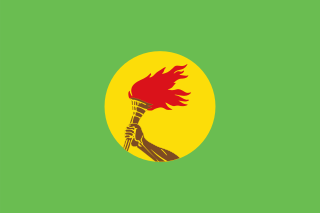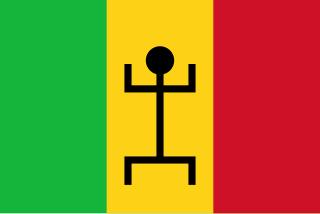| Part of the Politics series |
| Party politics |
|---|
| |
This is a List of political parties in Africa by country, linking to the country list of parties and the political system of each country in the region.
| Part of the Politics series |
| Party politics |
|---|
| |
This is a List of political parties in Africa by country, linking to the country list of parties and the political system of each country in the region.
| Country | Multi party | Two party | Dominant party | Single party | No party | |
|---|---|---|---|---|---|---|
| | Algeria | • | ||||
| | Egypt | • | ||||
| | Libya | • | ||||
| | Morocco | • | ||||
| | Sudan | • | ||||
| | Tunisia | • | ||||
| | Western Sahara | • | ||||
| Country | Multi party | Two party | Dominant party | Single party | No party | |
|---|---|---|---|---|---|---|
| | Angola | • | ||||
| | Cameroon | • | ||||
| | Central African Republic | • | ||||
| | Chad | • | ||||
| | Congo (Kinshasa) | • | ||||
| | Congo (Brazzaville) | • | ||||
| | Equatorial Guinea | • | ||||
| | Gabon | • | ||||
| | São Tomé and Príncipe |
| Country | Multi party | Two party | Dominant party | Single party | No party | |
|---|---|---|---|---|---|---|
| | Botswana | • | ||||
| | Lesotho | • | ||||
| | Namibia | • | ||||
| | South Africa | • | ||||
| | Eswatini | • | ||||
| | Zimbabwe | • |
| Country | Multi party | Two party | Dominant party | Single party | No party | |
|---|---|---|---|---|---|---|
| | Benin | • | ||||
| | Burkina Faso | • | ||||
| | Cape Verde | • | ||||
| | Cote d'Ivoire | • | ||||
| | Gambia | • | ||||
| | Ghana | • | ||||
| | Guinea | • | ||||
| | Guinea-Bissau | • | ||||
| | Liberia | • | ||||
| | Mali | • | ||||
| | Mauritania | • [1] | ||||
| | Niger | • | ||||
| | Nigeria | • | ||||
| | Senegal | • | ||||
| | Sierra Leone | • | ||||
| | Togo | • |
| Country | Multi party | Two party | Dominant party | Single party | No party | |
|---|---|---|---|---|---|---|
| | Burundi | • | ||||
| | Comoros | • [2] | ||||
| | Djibouti | • | ||||
| | Eritrea | • | ||||
| | Ethiopia | • | ||||
| | Kenya | • | ||||
| | Madagascar | • | ||||
| | Malawi | • | ||||
| | Mauritius | • | ||||
| | Mozambique | • | ||||
| | Rwanda | • | ||||
| | Somalia | • | ||||
| | Seychelles | • | ||||
| | South Sudan | • | ||||
| | Tanzania | • | ||||
| | Uganda | • | ||||
| | Zambia | • | ||||
| | Zimbabwe | • | ||||

The politics of Equatorial Guinea take place in a framework of a presidential republic, whereby the President is both the head of state and head of government. Executive power is exercised by the government. Legislative power is vested in both the government and the Chamber of People's Representatives

The two-round system, also called ballotage, top-two runoff, or two-round plurality, is a single winner voting method. It is sometimes called plurality-runoff, although this term can also be used for other, closely-related systems such as ranked-choice voting or the exhaustive ballot. It falls under the class of plurality-based voting rules, together with instant-runoff and first-past-the-post (FPP). In a two-round system, both rounds are held under choose-one voting, where the voter marks a single favorite candidate. The two candidates with the most votes in the first round proceed to a second round, where all other candidates are excluded.

Zaire, officially the Republic of Zaire, was the name of the Democratic Republic of the Congo from 1971 to 1997. Located in Central Africa, it was, by area, the third-largest country in Africa after Sudan and Algeria, and the 11th-largest country in the world from 1965 to 1997. With a population of over 23 million, Zaire was the most populous Francophone country in Africa. Zaire played a central role during the Cold War.
The History of Benin since the 16th century, for the geographical area included in 1960 in what was then called the Republic of Dahomey before becoming the People's Republic of Benin.
Single non-transferable vote or SNTV is an electoral system used to elect multiple winners. It is a semi-proportional variant of first-preference plurality, applied to multi-member districts where each voter casts just one vote. SNTV generally makes it unlikely that a single party will take over all seats in a city, as generally happens with winner-take-all systems. SNTV is highly similar to cumulative voting, and can be considered a variant of dot voting where each voter has only one point to assign.

The Politics of Benin take place in the framework of a presidential representative democratic republic, wherein the President of Benin is both head of state and head of government, and of a multi-party system. Executive power is exercised by the government. Legislative power is vested in both the government and the legislature. The Judiciary is independent of the executive and the legislature. The current political system is derived from the 1990 Constitution of Benin and the subsequent transition to democracy in 1991. The Economist Intelligence Unit rated Benin a "hybrid regime" in 2022.
A one-party state, single-party state, one-party system or single-party system is a governance structure in which only a single political party controls the ruling system. All other parties are either outlawed or only enjoy limited and controlled participation in elections. Sometimes the term "de facto one-party state" is used to describe a dominant-party system that, unlike the one-party state, allows democratic multiparty elections, but the existing practices or balance of political power effectively prevent the opposition from winning power.

Mixed-member proportional representation is a type of representation provided by some mixed electoral systems which combine local winner-take-all elections with a compensatory tier with party lists, in a way that produces proportional representation overall. Like proportional representation, MMP is not a single system, but a principle and goal of several similar systems. Some systems designed to achieve proportionality are still called mixed-member proportional, even if they generally fall short of full proportionality. In this case, they provide semi-proportional representation.

The French Union was a political entity created by the French Fourth Republic to replace the old French colonial empire system, colloquially known as the "French Empire". It was de jure the end of the "indigenous" status of French subjects in colonial areas.

The National Party, also known as the Nationalist Party, were a political party in South Africa from 1914 to 1997, which was responsible for the implementation of apartheid rule. The party was an Afrikaner ethnic nationalist party, which initially promoted the interests of Afrikaners but later became a stalwart promoter and enactor of white supremacy, for which it is best known. It first became the governing party of the country in 1924. It merged with its rival, the SAP, during the Great Depression, and a splinter faction became the official opposition during World War II and returned to power. With the National Party governing South Africa from 4 June 1948 until 9 May 1994, the country for the bulk of this time was only a de jure or partial democracy, as from 1958 onwards non-white people were barred from voting. In 1990, it began to style itself as simply a South African civic nationalist party, and after the fall of apartheid in 1994, attempted to become a moderate conservative one. The party's reputation was damaged irreparably by perpetrating apartheid, and it rebranded itself as the New National Party in 1997 before eventually dissolving in 2005.

The United Party was a political party in South Africa. It was the country's ruling political party between 1934 and 1948.

The Mali Federation was a federation in West Africa linking the French colonies of Senegal and the Sudanese Republic for two months in 1960. It was founded on 4 April 1959 as a territory with self-rule within the French Community and became independent after negotiations with France on 20 June 1960. Two months later, on 19 August 1960, the Sudanese Republic leaders in the Mali Federation mobilized the army, and Senegal leaders in the federation retaliated by mobilizing the gendarmerie ; this resulted in a tense stand-off, and led to the withdrawal from the federation by Senegal the next day. The Sudanese Republic officials resisted this dissolution, cut off diplomatic relations with Senegal, and defiantly changed the name of their country to Mali. For the brief existence of the Mali Federation, the premier was Modibo Keïta, who would later become the first President of Mali, and its government was based in Dakar, the eventual capital of Senegal.

The Socialist Party of Azania (SOPA) was a political party in South Africa adhering to Black Consciousness theory. In the 2004 general elections, it received 0.1% of the vote and no legislatorial seats at either the national or provincial levels.
Particracy, also known as partitocracy, partitocrazia or partocracy, is a form of government in which the political parties are the primary basis of rule rather than citizens or individual politicians.

The apartheid system in South Africa was ended through a series of bilateral and multi-party negotiations between 1990 and 1993. The negotiations culminated in the passage of a new interim Constitution in 1993, a precursor to the Constitution of 1996; and in South Africa's first non-racial elections in 1994, won by the African National Congress (ANC) liberation movement.
A single-member district or constituency is an electoral district represented by a single officeholder. It contrasts with a multi-member district, which is represented by multiple officeholders.

The storming of the Kempton Park World Trade Centre took place in South Africa on 25 June 1993 when approximately three thousand members of the Afrikaner Volksfront (AVF), Afrikaner Weerstandsbeweging (AWB) and other right-wing Afrikaner paramilitary groups stormed the World Trade Centre in Kempton Park, near Johannesburg.

The Congress of the People (COPE) is a South African political party formed in 2008 by former members of the African National Congress (ANC). The party was founded by former ANC members Mosiuoa Lekota, Mbhazima Shilowa and Mluleki George to contest the 2009 general election. The party was announced following a national convention held in Sandton on 1 November 2008, and was founded at a congress held in Bloemfontein on 16 December 2008. The name echoes the 1955 Congress of the People at which the Freedom Charter was adopted by the ANC and other parties, a name strongly contested by the ANC in a legal move dismissed by the Pretoria High Court.